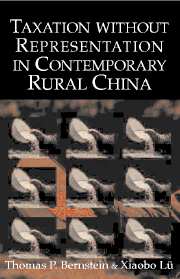Book contents
- Frontmatter
- Contents
- List of Journals, Newspapers, Translation Services, and Abbreviations
- List of Tables and Figures
- Preface
- 1 Introduction
- 2 Peasants and Taxation in Historical Perspective
- 3 Extracting Funds from the Peasants
- 4 Institutional Sources of Informal Tax Burdens
- 5 Burdens and Resistance: Peasant Collective Action
- 6 Containing Burdens: Change and Persistence
- 7 Burden Reduction: Village Democratization and Farmer National Interest Representation
- 8 Conclusions
- Bibliography
- Index
7 - Burden Reduction: Village Democratization and Farmer National Interest Representation
Published online by Cambridge University Press: 13 July 2009
- Frontmatter
- Contents
- List of Journals, Newspapers, Translation Services, and Abbreviations
- List of Tables and Figures
- Preface
- 1 Introduction
- 2 Peasants and Taxation in Historical Perspective
- 3 Extracting Funds from the Peasants
- 4 Institutional Sources of Informal Tax Burdens
- 5 Burdens and Resistance: Peasant Collective Action
- 6 Containing Burdens: Change and Persistence
- 7 Burden Reduction: Village Democratization and Farmer National Interest Representation
- 8 Conclusions
- Bibliography
- Index
Summary
THE financial and administrative reforms analyzed in the preceding chapter did not make much of a dent in the burden problem. They therefore did not end the crisis in state-peasant relations caused to a significant extent by the imposition of unreasonable financial levies. Attempting to control local officials only from above was simply inadequate. Pressure on cadres had to be exerted from below as well, that is, by the peasantry. Otherwise, as officials of the Ministry of Civil Affairs argued in seeking to convince central leaders of the necessity for village elections, it would not be possible to contain the explosive potential of peasant anger. Villagers needed legitimate institutionalized means through which to advance their claims and seek redress lest they be compelled to take to the street.
The regime recognized this. As shown in Chapter 6, it allowed the system of individual and collective petitioning to function and it fostered the establishment of legal institutions in the countryside. In addition, it promoted democratization, including elections of village leaders, village self-rule, and “open and transparent” conduct of village affairs (cunwu gongkai). The latter applied especially to finances, in which villagers had a keen and vital interest. Empowering villagers to defend themselves against illegal exactions and the abuses associated with them entailed alterations in the triangular relationship between the central state, the local state, and the peasants, essentially to the disadvantage of the local authorities.
- Type
- Chapter
- Information
- Taxation without Representation in Contemporary Rural China , pp. 206 - 240Publisher: Cambridge University PressPrint publication year: 2003

